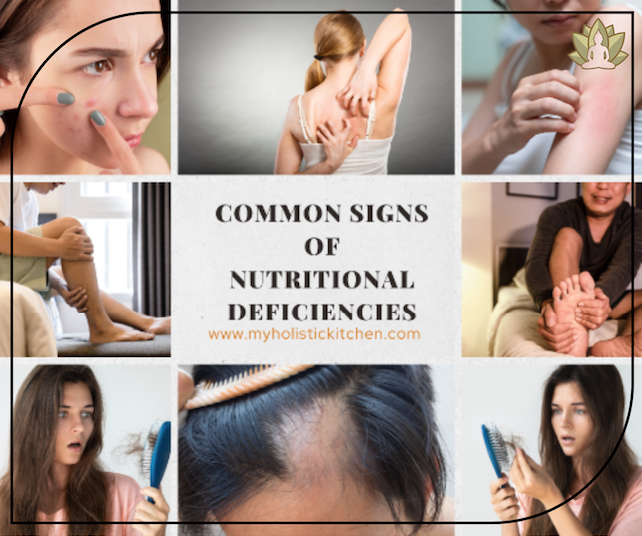
Do not ignore these common signs of Nutritional Deficiencies
Nutrients are essential for the body because they provide the building blocks and fuel necessary for life! They perform critical functions that allow the body to grow, repair, and maintain itself.
Micro-nutrients ~ Vitamins and minerals are required by the body for so many functions.
First of all, they are needed for digestion, absorption and assimilation of macronutrients ~ carbohydrates, proteins and fats. They are needed for proper metabolism. They are important for proper elimination of toxins from the body. They are important for the smooth functioning of all systems of the body ~ cardiovascular system, immune system, digestive system, respiratory system and overall strength of your body.
Did you know that the body often gives clear signals when something is physiologically wrong, as a way to alert us to underlying issues. These signs are usually symptoms that can indicate nutrient deficiencies, imbalances, or other health concerns. Being in tune with your body’s needs and being aware of these signs of nutritional deficiencies can prevent you from major health problems in the long run.
In this blog let’s explore some of the common signs of nutritional deficiencies so that you can better detect how your body is functioning and how you can heal faster.
If you notice some of these signs, don’t get stressed out! These signs are fixable and if you take corrective action soon, you may be able to prevent yourself from long term health problems.
Sign #1: Hair Loss
Unusual hair loss may be an indicator that there is some kind of hormonal imbalance or other physiological concerns. We usually ignore the fact that there is a direct co-relation of hair loss to deficiency of several crucial nutrients!
In general, there could be a deficiency of proteins, iron, zinc & EFA. Studies show that Vitamin B7 called biotin which is a water-soluble B vitamin has a crucial role in the health of our hair and skin. It is important to have a steady supply of biotin. Biotin is involved in several essential enzymatic reactions necessary for metabolism of amino acids and is especially critical in fatty acid metabolism.
When biotin levels are depleted, a deficiency can result in alopecia or the loss of hair follicles in spots or patches on the head and body. Biotin deficiency is also associated with inflammation on the skin. These signs should not be ignored, especially during early childhood.
Overuse of antibiotics could lead to biotin deficiency. Intestinal malabsorption due leaky gut syndrome or another inflammatory gut disorder could also lead to B7 deficiency.
Eat foods rich in biotin such as organ meats, eggs especially egg yolk, beef, raspberries, nuts, mushrooms, avocados, cauliflower, fish and seafood. Eggs contain a protein called avidin, that when consumed raw, inhibits the ability of the body to effectively absorb biotin. Cooking eggs destroys the avidin protein disabling it from affecting biotin absorption.
Sign #2: Skin problems– Itchy skin, Rashes, Acne & Blemishes
Several skin problems are associated with nutritional deficiencies. Skin conditions such as psoriasis, eczema, severe acne and even skin pigmentation could all be a sign of nutritional deficiencies. You may be told to use moisturizers and sometimes given anti-inflammatory medications. Holistic nutritionists would recommend dietary changes to begin with and even nutritional supplements if needed.
Trying to reach the root cause of your skin issues is more important than using a band aid approach and suppressing the inflammation with anti-inflammatory medications. Learning if your skin blemishes are caused by lack of adequate nutrients in your diet may be the first step towards fixing your problem. The most common nutritional deficiencies with skin conditions include fat soluble nutrients such as vitamin A, vitamin D and vitamin E and omega 3 fatty acids.
If you don’t consume a healthy diet and have a lot of stress, you are bound to develop a lot of skin issues. I would recommend including foods rich in vitamin A and E such as grass-fed butter or ghee and lots of vegetables (orange, yellow, red and green), nuts and seeds and supplement with omega-3 supplements. Most people are deficient in the long chain omega 3 fatty acids EPA and DHA and this can result in more inflammation and acne. A great source of the long-chain omega 3 fatty acids (EPA and DHA) is through purified fish oil supplement.
Vitamin A and D are necessary for a healthy immune response in the skin and can inhibit inflammatory skin reactions like persistent acne. Vitamin A supports the integrity of cells that make up epithelial tissue. Lack of vitamin A in your diet can cause dry, scaly skin that stimulates premature aging.
Foods rich in vitamin A include liver, organic eggs from pasture-raised chickens, dark green vegetables, carotenoid containing produce like carrots and sweet potato as well as milk, butter and ghee from 100% grass-fed cows.
Sun is the primary origin of vitamin D synthesis for your skin, grass-fed butter is also high in vitamin D. You may consider supplementing your diet with cod liver oil as this provides a healthy balance between vitamin A & D.
For a glowing skin, I would recommend that you keep all sugars out of your diet and look out for other triggers like dairy proteins and gluten.
I would also recommend adding in probiotics to support gut health. There are many natural recipes that are great sources of probiotics. Sauerkraut is excellent!
Apply coconut oil along with a few drops of essential oils like rose or lavender to your skin to help improve the skin’s microbiome and reduce inflammation on the surface of the skin.
Sign #3: Muscle Cramps
Frequent muscle cramps in the calves, arches of the feet and a stabbing sensation in your toes may be a sign that you are deficient in one of the critical minerals and electrolytes required for proper functioning of the neuro-musculoskeletal system.
These days more and more people have started going to the gym for regular exercise on a daily basis and this is a great step towards health. But if you have been stretching yourself a bit too much and over exercising, then there is a chance that you are losing electrolytes and minerals.
Magnesium deficiency is one of the most common nutritional deficiency! It is also one of the most critical minerals in supporting healthy nerve function in the body aiding in muscle relaxation. Depleted magnesium levels can lead to the imbalance in calcium ion channels throughout the body which could manifest as various symptoms.
Along with magnesium, a potassium deficiency can cause cramping in leg muscles. Potassium is also involved in maintaining the integrity of cellular fluid and works closely with other minerals like calcium to support nerve function and smooth muscle tone.
Inadequate calcium absorption or calcium deficiency could also lead to muscle cramps. Calcium is involved in muscle contractions and assists in generating nerve impulses.
Vitamin D is critical to regulate and increase the absorption of calcium and may be an underlying cause or another underlying issue of your calcium deficiency.
Excellent sources of magnesium in foods are found in green leafy vegetables, avocados, pumpkin seeds and unsweetened cacao. Brazil nuts and almonds contain high amounts of both magnesium and potassium. Both calcium and magnesium can be received in combination with a healthy ratio of vitamin D3 to regulate calcium absorption in fermented foods like kefir, yogurt and milk from 100% grass-fed animals. Coconut water is a great source of potassium as well. In addition, I recommend using pink Himalayan salt on food and hydrating well throughout the day.
Go for Epsom salt baths (excellent for magnesium absorption through the skin) and sunbathing (great for vitamin D).
Many essential oils have natural antispasmodic qualities, which help with spasms, cramps and muscle pulls. Some good ones include lavender, chamomile, rosemary or cypress. You can massage these onto your legs, diffuse them in your home or put them into your Epsom salt bath.
Reasons for Nutritional Deficiencies: –
There are several reasons why someone may have nutritional deficiencies……
Of-course a diet that is low in micronutrients and high in sugar and processed foods is the main reason for deficiency of nutrients in our body!
Did you know digestive issues such as low stomach acid and leaky gut could also lead to poor nutrient absorption? If you are not producing enough stomach acid, you may not be optimally absorbing nutrients such as B12, zinc and iron.
The health of the gut microbiota is a significant contributor to the body’s ability to effectively absorb nutrients from food. Different species of bacteria inhabit the gut providing a variety of benefits for health. They have the ability to breakdown food into bioavailable form which can be easily absorbed and transported to cells.
Your gut is the first to be impacted by stress. Chronic stress depletes key nutrients and lead to nutritional deficiencies. Stress creates inflammation in the GI tract impacting the function of microvilli in the absorption of nutrients.
In fact, everyday stress to the body can create a vicious cycle. Stress affects digestion, which can cause nutritional deficiencies, which can further induce symptoms of stress such as depression and anxiety which further depletes the body’s storage of vital vitamins and minerals.
Blood sugar imbalances could also lead to nutritional deficiencies. Refined carbs and table sugar lead to nutrient loss. They lead to nutrient debt rather than providing us with any nutrient!
As you age, the body becomes less efficient at absorbing nutrients and detoxification pathways are further hindered.
I am sure, all of us have had one or more of these factors for a period of time in our life and it is quite possible you are struggling with one right now that is contributing to nutritional deficiencies in your body.
Take action now: –
Making wise dietary choices is the first step to fine tuning the nutritional deficiencies that your body is facing.
Consume a wide variety of produce and try to include various colors of the rainbow from fruits and vegetables on your plate. Be sure to choose organic produce to consume foods with the highest nutritional density.
AVOID Processed and commercialized meats all together. When choosing to eat red meat, make the choice to consume only grass-fed red meat.
AVOID unhealthy fats high in trans-fats or partially hydrogenated oils found in butter substitutes, ice cream, vegetable oil and generally all processed foods.
AVOID simple sugars including high fructose corn syrup and table sugar which feed pathogenic bacteria and create metabolic disturbances.
Choose to drink pure filtered water, probiotic beverages like coconut water, kefir and herbal teas in replacement of your soda, juice and energy drinks.
Most important- Learn to manage stress in life!
Want to learn more and get a complete picture……
Check out OUR SELF-PACED ONLINE COURSES that include a perfect blend of Holistic Nutrition and ancient Ayurvedic wisdom!
- BASICS OF HEALTHY EATING
- DIGESTION- THE KEY TO GOOD HEALTH
- BASICS OF AYURVEDA
- THE COMPLETE GUIDE TO STRESS MANAGEMENT
- THE COMPLETE GUIDE TO MANAGING BLOOD PRESSURE NATURALLY
- THE COMPLETE GUIDE TO AN EASY MENOPAUSE
- TAKE CONTROL OF YOUR BLOOD SUGAR NATURALLY
- MANAGE BACK PAIN USING DIET & LIFESTYLE
- HAIR LOSS IN FEMALES (CAUSES AND HOLISTIC SOLUTIONS)
USE DISCOUNT COUPON CODE at checkout for 75% off : LEARNINGFORLIFE (limited time only)
CONNECT WITH US & BE THE FIRST ONE TO RECEIVE DISCOUNT COUPONS FOR ANY OF OUR SERVICES!
NAMASTE,

Preeti Syal
M.Sc., R.H.N., Certified Ayurvedic Lifestyle Consultant
The content provided in my blogs are for knowledge sharing purposes only and is not intended to be a substitute for professional medical advice, diagnosis or treatment.


